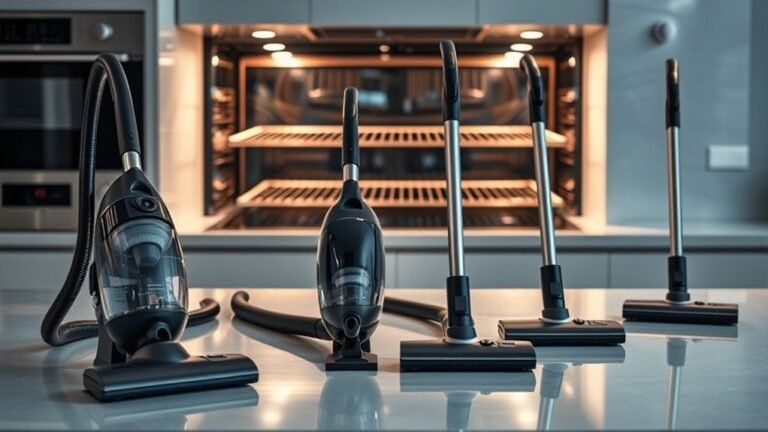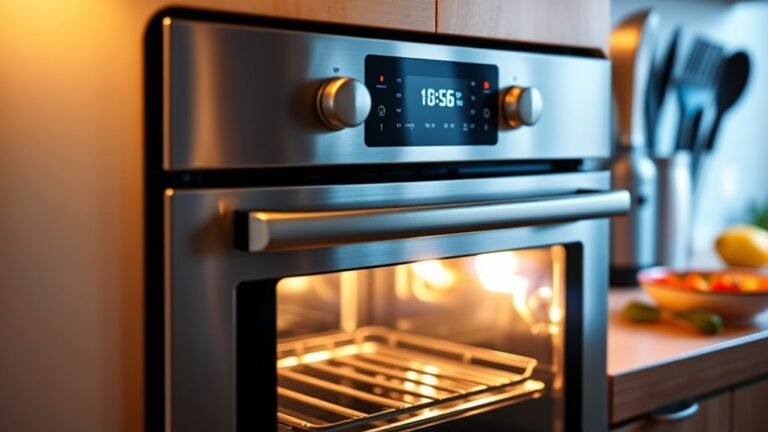Best Products to Clean Your Kitchen
To clean your kitchen effectively, use all-purpose cleaners that work on countertops and appliances without damage. Tackle tough grease with specialized degreasers—citrus or enzyme-based types are great choices. For daily maintenance, eco-friendly products reduce chemicals and protect surfaces. Disinfectant sprays and wipes kill germs quickly, while stainless steel cleaners keep appliances shiny. Don’t forget enzymatic sink cleaners and drain remedies to prevent clogs. With the right cleaners and tools, managing kitchen hygiene becomes straightforward—you’ll find even more tips to elevate your routine.
All-Purpose Kitchen Cleaners
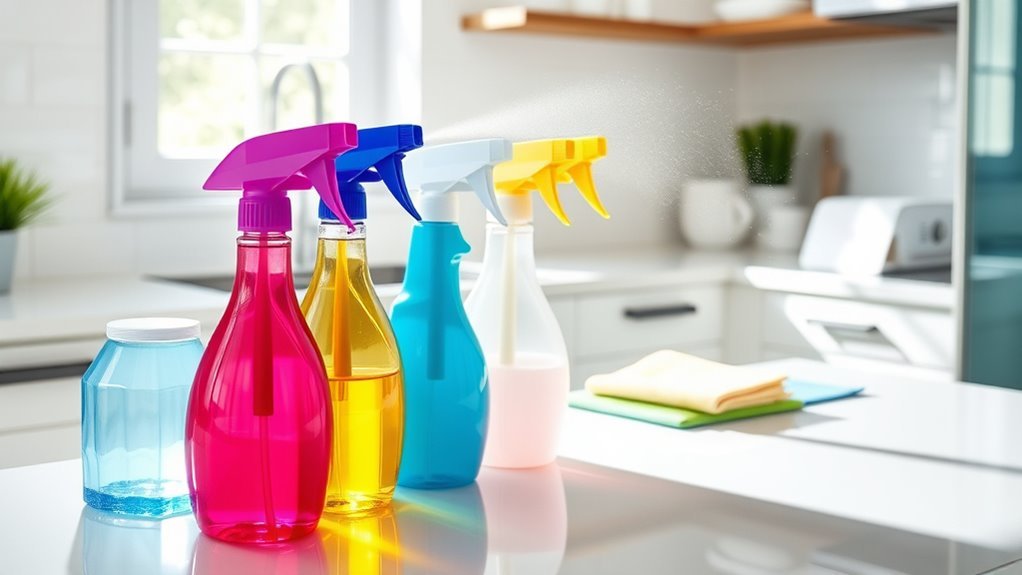
All-purpose kitchen cleaners are essential for maintaining a hygienic and efficient cooking space. When selecting a product, you’ll want one that offers versatile all purpose uses, allowing you to tackle countertops, appliances, and sinks without switching cleaners. Pay close attention to surface compatibility to guarantee the cleaner won’t damage delicate finishes like granite, stainless steel, or laminate. You can confidently use these cleaners on multiple surfaces, saving time and reducing clutter. The best all-purpose kitchen cleaners balance effective grime removal with gentle formulas that preserve your kitchen’s integrity. By choosing a product that meets these criteria, you gain freedom from multiple specialized products, streamlining your cleaning routine while keeping every surface spotless and safe. Avoiding abrasive cleaners is crucial to prevent scratches and maintain the finish on delicate surfaces, as detailed in cleaning mistakes that damage your kitchen.
Grease-Fighting Degreasers
While all-purpose cleaners handle everyday messes, stubborn grease and baked-on residues demand a product designed specifically for breaking down oils and fats. Grease-fighting degreasers excel at dissolving tough grime by employing advanced grease removal techniques. Whether you’re tackling your stovetop or oven, industrial degreasers offer powerful solutions that save you time and effort. For best results, always use non-abrasive cleaners to protect your appliance surfaces during cleaning.
| Product Type | Best For | Key Feature |
|---|---|---|
| Citrus-based | Light grease | Natural solvent action |
| Solvent-based | Heavy industrial grease | Fast-acting formula |
| Enzyme-based | Organic grease | Biodegradable enzymes |
| Alkaline-based | Baked-on residues | High pH for breakdown |
| Water-based | Everyday kitchen grease | Easy rinsing |
Choose a degreaser aligned with your grease removal needs and enjoy a pristine kitchen with less hassle.
Natural and Eco-Friendly Cleaning Products
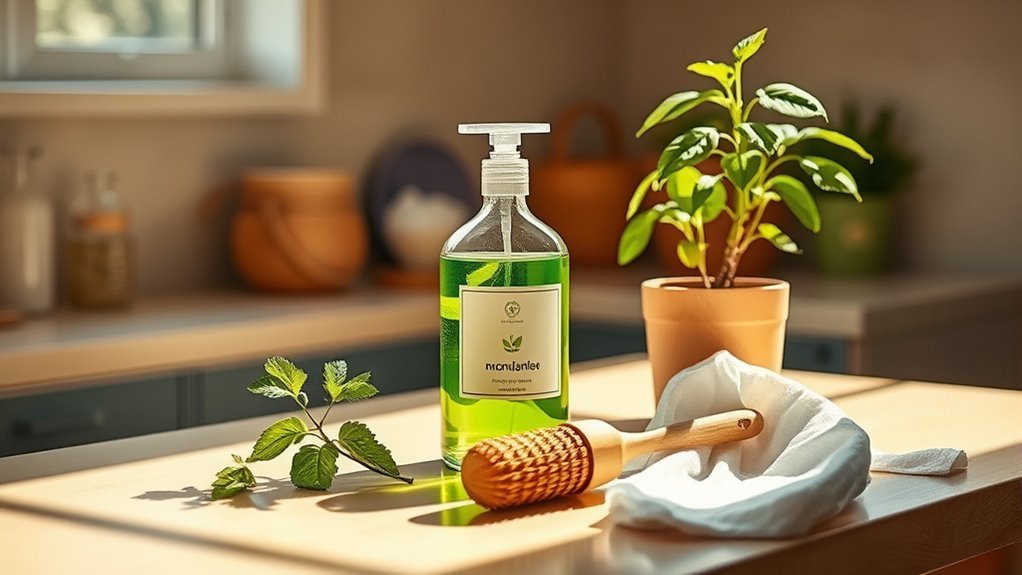
You’ll find that natural ingredients not only reduce harmful chemical exposure but also minimize environmental impact. Several popular eco-friendly brands offer effective kitchen cleaners that prioritize sustainability and safety. Plus, you can easily create your own cleaning solutions at home with simple, non-toxic recipes. Homemade cleaners typically have a shelf life of one to three months, so proper storage is important to maintain their effectiveness.
Benefits of Natural Ingredients
Because natural ingredients break down more easily than synthetic chemicals, they reduce environmental impact considerably. Choosing natural cleaning products means you’re protecting both your health and the planet. You’ll benefit from fewer toxic residues lingering on your kitchen surfaces, promoting a safer environment for you and your family. Here’s why natural ingredients stand out:
- Health Benefits: They minimize exposure to harsh chemicals that can cause allergies or respiratory issues.
- Reduced Environmental Impact: Natural compounds biodegrade quickly, lessening pollution and conserving ecosystems.
- Sustainable Sourcing: Many natural ingredients come from renewable resources, supporting eco-friendly production.
Popular Eco-Friendly Brands
Understanding the benefits of natural ingredients helps you appreciate why many brands focus on creating effective, eco-friendly kitchen cleaning products. When choosing, look for those that prioritize sustainable packaging, reducing environmental impact without compromising quality. Brands with cruelty free certifications guarantee no animal testing, aligning with ethical standards you likely value. Companies such as Seventh Generation, Method, and Ecover consistently deliver potent formulations using plant-based components. They balance performance with responsibility, offering options that clean thoroughly while minimizing toxins. By selecting these trusted names, you support a market shift toward transparency and sustainability. This approach not only protects your kitchen’s cleanliness but also contributes to a healthier planet, empowering your freedom to make conscientious choices every time you shop.
DIY Eco Cleaning Recipes
Anyone interested in reducing chemical exposure and waste can benefit from making their own eco-friendly kitchen cleaners. DIY eco cleaning recipes empower you to control ingredients while protecting the environment. Here are three effective homemade surface cleaners using vinegar and baking soda:
- All-Purpose Cleaner: Mix equal parts water and white vinegar in a spray bottle. Use it to clean countertops and appliances safely.
- Deodorizing Scrub: Combine baking soda with a small amount of water to create a paste. Apply it to sinks or stovetops to remove grime and odors.
- Drain Cleaner: Pour half a cup of baking soda down the drain, followed by half a cup of vinegar. Let it fizz for 10 minutes, then flush with hot water.
These simple recipes offer freedom from harsh chemicals while maintaining a spotless kitchen.
Disinfectant Sprays and Wipes
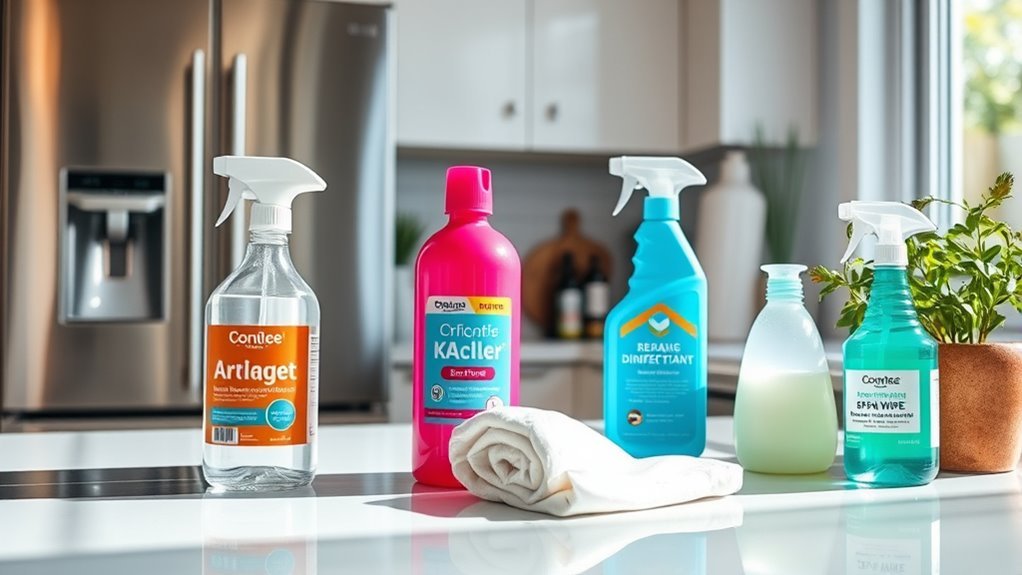
Disinfectant sprays and wipes offer a convenient and effective way to eliminate germs on kitchen surfaces. When you choose products with strong antibacterial properties, you guarantee thorough surface sanitization, reducing the risk of contamination. These sprays and wipes are designed to work quickly, allowing you to clean countertops, cutting boards, and handles efficiently. For best results, apply the spray or wipe directly to the surface, making sure it remains wet for the recommended contact time to maximize germ elimination. You’ll appreciate the freedom to maintain a hygienic kitchen effortlessly, especially during busy days. Selecting products with clear labeling and proven efficacy helps you stay confident that your cleaning routine truly protects your household without unnecessary hassle or waiting. Be sure to apply disinfectant according to product directions, ensuring surfaces remain wet for the recommended contact time and allowing them to air dry for optimal effectiveness.
Stainless Steel and Appliance Cleaners
While disinfectant sprays and wipes keep your kitchen germ-free, maintaining the appearance and functionality of your stainless steel appliances requires specialized care. Stainless steel surfaces can easily show fingerprints and smudges, so choosing the right cleaner is essential for effective appliance maintenance. Here’s what you should focus on:
- Use a non-abrasive stainless steel cleaner designed to remove grime without scratching.
- Apply cleaners with a microfiber cloth, wiping in the direction of the grain to preserve the finish.
- Regularly polish appliances to prevent streaks and maintain their shine, extending their lifespan. Regular cleaning not only maintains appearance but also helps improve appliance efficiency by preventing buildup that can interfere with performance.
Sink and Drain Cleaning Solutions
You’ll want to choose sink cleaners that effectively remove grease and stains without damaging your fixtures. Natural drain remedies like baking soda and vinegar can break down buildup while being safe for pipes. Regular maintenance and mindful disposal habits are key to preventing clogs before they start.
Effective Sink Cleaners
A clean sink is essential for maintaining kitchen hygiene and preventing unpleasant odors. When selecting effective sink cleaners, focus on products that not only remove grime but also tackle bacteria and odors efficiently. Here are three top sink maintenance tips to keep your sink fresh and spotless:
- Use enzymatic cleaners to break down organic matter, providing long-lasting sink odor solutions.
- Apply a baking soda and vinegar paste for gentle abrasion and natural deodorizing without harsh chemicals.
- Choose antibacterial sprays with quick-drying formulas to kill germs and prevent buildup.
Following these tips guarantees your sink remains a hygienic workspace, free from odors and clogs. Regular use of targeted cleaners will give you the freedom to enjoy a fresh kitchen environment every day.
Natural Drain Remedies
Natural drain remedies offer an eco-friendly and effective alternative to harsh chemical cleaners for maintaining clear sinks and drains. You can rely on simple, natural ingredients like baking soda and vinegar to break down buildup without damaging your pipes. For routine drain maintenance, pour half a cup of baking soda followed by half a cup of vinegar down the drain, then flush with hot water after 15 minutes. This method helps dissolve residue and discourages clogs. Lemon juice mixed with baking soda also freshens drains and aids in clog prevention. Using these natural solutions empowers you to keep your kitchen plumbing free-flowing while avoiding toxic substances, giving you control over a safer, sustainable cleaning routine that supports both your home and the environment.
Preventing Clogs Easily
Although clogs can seem inevitable, preventing them is often a matter of consistent, simple habits and the right cleaning solutions. Effective clog prevention and sink maintenance hinge on proactive care. Here’s how you can keep your drains flowing freely:
- Use Drain Screens: Catch food scraps and debris before they enter your pipes, reducing buildup and blockages.
- Regular Flushing: Pour boiling water weekly down your sink to dissolve grease and soap residues.
- Natural Cleaners: Employ enzyme-based cleaners to break down organic matter without harsh chemicals.
Specialty Tools and Scrubbers
Specialty tools and scrubbers are designed to tackle cleaning tasks that standard sponges or cloths can’t handle effectively. When you want to free your kitchen from stubborn grime, specialty brushes and scrub pads become essential. These tools reach tight corners, scrub textured surfaces, and remove baked-on residue without damaging finishes.
| Tool Type | Best Use |
|---|---|
| Specialty Brushes | Crevices, grout lines |
| Heavy-Duty Pads | Pots, pans, oven racks |
| Microfiber Scrubbers | Delicate surfaces, glassware |
| Steel Wool Pads | Rust removal, tough stains |
| Silicone Brushes | Grease, food particles |
Choosing the right specialty tool lets you clean efficiently, preserving your kitchen’s integrity while giving you the freedom to maintain it yourself. Always remember to unplug appliances before cleaning nearby to ensure safety and prevent accidents.
Frequently Asked Questions
How Often Should I Deep Clean My Kitchen Appliances?
You should set your deep cleaning frequency for kitchen appliances at least every three to six months. This routine not only guarantees thorough appliance maintenance but also extends their lifespan and efficiency. Regular deep cleaning removes hidden grime and buildup that daily wiping misses. By sticking to this schedule, you’re freeing yourself from unexpected breakdowns and costly repairs, keeping your kitchen running smoothly without constant hassle.
Can I Use Kitchen Cleaners on Food Preparation Surfaces Safely?
Think of your food prep surfaces as a trusted bridge between you and nourishment. When it comes to kitchen cleaner safety, you must choose products labeled safe for food contact—these comply with food surface regulations ensuring no harmful residues remain. Always rinse thoroughly after cleaning to maintain that freedom to cook without worry. Using the right cleaner preserves both your health and your kitchen’s integrity, letting you focus on creating meals with confidence.
What Are the Best Methods to Remove Mold in the Kitchen?
To remove mold in your kitchen, start by scrubbing affected areas with a mixture of white vinegar and water—this natural remedy kills mold effectively. Make certain you wear gloves and ventilate the space well. After cleaning, focus on mold prevention by keeping surfaces dry and improving airflow. Regularly wipe down counters and fix leaks promptly. Using these methodical steps helps you maintain a mold-free, fresh kitchen environment without relying on harsh chemicals.
How Do I Properly Store Cleaning Products to Avoid Hazards?
To guarantee safety, you should focus on proper cleaning product organization and safe storage practices. Keep all products in a cool, dry place, away from direct sunlight and heat. Store them out of children’s reach, ideally in a locked cabinet. Make certain containers are sealed tightly and never mix different products. Label everything clearly, and separate chemicals from food items to avoid contamination. This way, you maintain a hazard-free environment.
Are There Any Kitchen Cleaning Products Safe for Pets Around?
You’ll find pet safe cleaners formulated without harsh chemicals, making them ideal if you want to keep your furry friends safe. Natural alternatives like vinegar, baking soda, and lemon juice work well for many kitchen surfaces and reduce exposure to toxins. When choosing products, check labels for non-toxic certifications and avoid those with ammonia or bleach. This way, you maintain a clean kitchen while ensuring your pets roam freely without risk.



